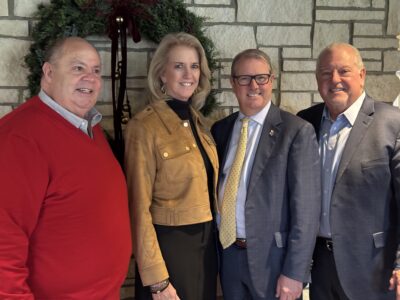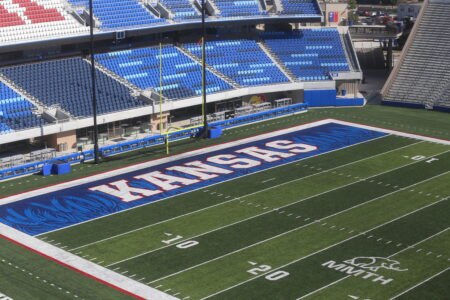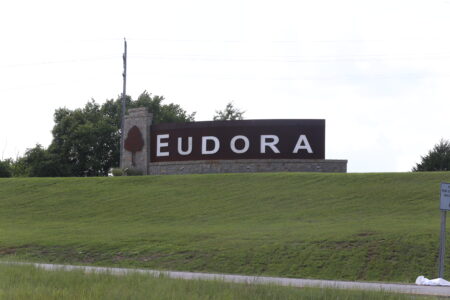
Berry Global, county’s largest private employer, is set to be bought by an even bigger plastics company

photo by: Chad Lawhorn/Journal-World
A warehouse location for Berry Global is shown on Dec. 4, 2024 near 23rd Street and O'Connell Drive in eastern Lawrence.
One of Douglas County’s biggest employers is set to get a new name — and a new boss.
Berry Global — which has multiple locations in and near Lawrence where it makes plastic cups and other such items — is in the process of being bought by a big international company.
Amcor — a plastics packaging company that is based in Switzerland but was founded in Australia — plans to combine with Berry Global in an all stock transaction that is expected to be finalized in the middle of 2025.
When the deal is complete, Berry’s operations are expected to take the name of Amcor. If you take that as a sign that Amcor is the dominant partner in this merger, you would be correct. Amcor shareholders are expected to own 63% of the combined company, with Berry shareholders owning the remainder. Amcor CEO Peter Konieczny will lead the combined company. Amcor will nominate seven of the company’s 11 board positions, with Berry nominating the other four.
What the change will mean to the Lawrence operations of Berry is largely unknown to the public. The companies didn’t announce any plans to close plants as part of the merger. The companies do expect about $650 million of benefits through “synergies,” which is often a corporate term for savings that come from reducing duplication.
That number is actually not huge, given that the overall deal is valued at about $8.4 billion. Some of those savings likely will come through synergies at Berry’s corporate headquarters, which are in Evansville, Ind. The headquarters for the combined company will be in Zurich, although Amcor said it intends to maintain a significant presence in Evansville.
As for Lawrence, the stakes are high. Berry is generally considered the largest private employer in Douglas County, overtaking Hallmark in recent years. Berry had 1,115 employees in Douglas County as of the middle of last year, according to figures compiled by the Economic Development Corporation of Lawrence and Douglas County.

photo by: Chad Lawhorn/Journal-World photo
Berry Global’s plant at 2330 Packer Road in Lawrence is shown on Sept. 14, 2021.
The company has a big footprint in the county, too. It has a manufacturing facility in the industrial park that is north of the Interstate 70 and McDonald Drive interchange in Lawrence. That is the old manufacturing facility for Packerware, which was a locally based plastics company that Berry bought in 1997.
Berry has a newer distribution facility just northwest of the Lawrence city limits. That facility, which is visible from I-70 and is near the Lecompton interchange on the turnpike, was a key component that helped Lawrence land a major Berry project to produce a more environmentally friendly version of plastic drink cups.
At the time of the project in 2021, we reported that was a $60 million project to produce a new thermoform, polypropylene plastic cup line that has been touted as being easier to recycle and more environmentally sustainable than other plastic cup lines. Fast food restaurants and convenience store chains have been the major customers for that cup line. When you are filling up your soda at a convenience store, there’s a decent chance your cup was made in Lawrence.
I’m no expert on Amcor’s business, but after a little research it doesn’t appear that is a big part of what it currently does. That’s probably good for Berry’s operations in Lawrence. Presumably, Amcor would be interested in being in the business of making drink cups for stores and restaurants across the globe, and thus the Lawrence operations would be of value to Amcor. Again, though, that is a rudimentary analysis on my part, but I’ve read nothing from the professional analysts that would suggest otherwise.

photo by: Chad Lawhorn/Journal-World photo
Examples of several types of products made by Berry Global are shown at economic development announcement on KU’s West Campus on Sept. 14, 2021. Berry announced that it is expanding its Lawrence manufacturing plant with more cup-making equipment and jobs.
In terms of what Amcor does currently, it appears one of its big businesses is making plastic bottles for the drink industry. I think Pepsi and Coca-Cola are both big customers of Amcor, but it appears it makes everything from shampoo bottles to yogurt containers, plus many other pieces of plastic packaging.
The merger of the two companies will require various regulatory approvals both in the U.S. and elsewhere. There’s a chance regulators will require the companies to divest from some of their businesses. There’s also a chance the combined company may want to exit some businesses to concentrate on others. At the moment, though, I’ve seen no reports of drink cups being part of that. Berry, shortly after the merger was announced late last month, did announce a sale of one of its smaller divisions, a business that makes specialty tapes for HVAC and building industries.
In a recent call with investors, Amcor said the combined company would focus on health care, protein, pet food, liquids, beauty and personal care and food service as areas to heavily serve, the industry website PackagingDive reported. Lawrence’s cup business seemingly would fit into the food service focus for the company.
When completed, the deal will end Berry’s run on the New York Stock Exchange. The company will instead trade as part of Amcor, which is listed on both the New York Stock Exchange and the Australian Securities Exchange. The deal valued Berry at $73.59 per share, which was about 10% higher than where it was trading prior to the merger announcement.
Amcor, while technically a Swiss-based company, has a long history in Australia. It traces its roots back to an 1860s paper company near Melbourne, Australia. About 100 years later, the company was more generally in the packaging business rather than the paper business. That included plastic packaging. Amcor already was a major player in the plastic industries, and often has been identified as the largest producer of certain types of plastic packaging.
But with the merger, it would take another big step up. Some analysts have projected that the combined company would become the largest purchaser of plastic resin — the raw material of most plastic products — in the world, PackagingDive reported.







